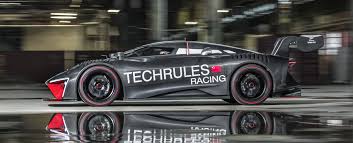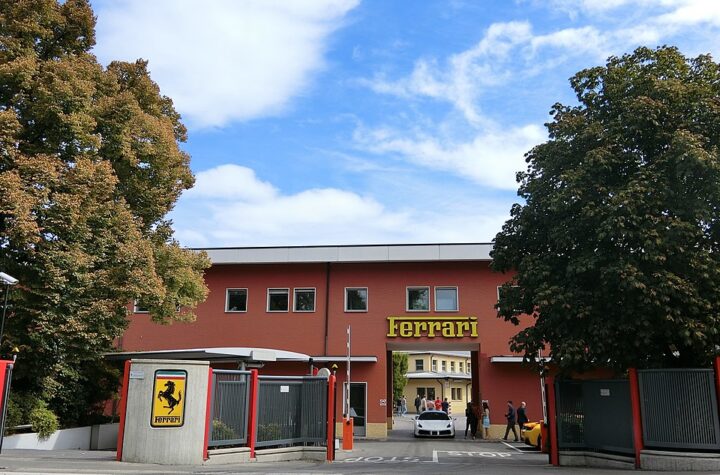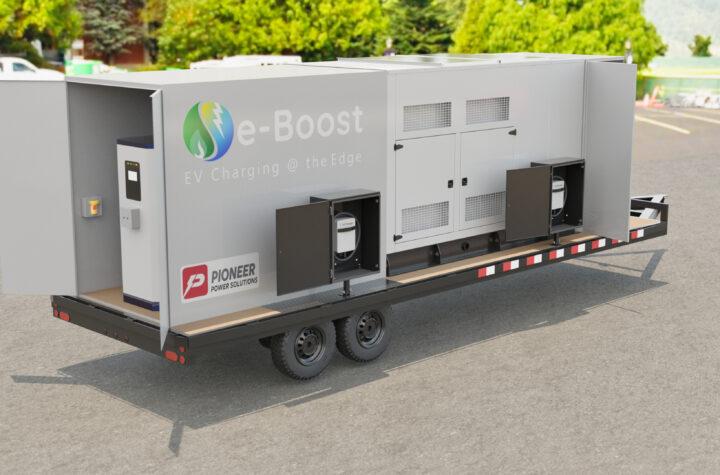
China’s first supercar company – Techrules – is on the road towards commercial production.
The company revealed the production design for its high-performance Ren RS supercar at the 88th Geneva Motor Show. In addition to establishing key partnerships with China-based global companies, Techrules says it is in discussion with potential international automotive partners to form strategic alliances to assist with the production and launch of vehicles for markets around the world.
The Beijing-based company is prioritizing the growth of its commercial capabilities by working with a number of global automotive and non-automotive companies. This will enable Techrules to further the development of its range-extending proprietary micro-turbine technology for a variety of mobility and industrial applications.
World premiere: Ren RS
The performance-focused Techrules Ren RS is a new single-seat, light-weight variant of the Ren supercar first previewed at the 2017 Geneva Motor Show. Presenting a similar dramatic, aerospace-inspired design and fighter jet-style canopy, the Ren RS has been crafted by world-renowned automotive designers Fabrizio and Giorgetto Giugiaro.
Designed for track use only, Ren RS has been honed for high performance racing by renowned motorsport specialist L.M. Gianetti of Turin. The Ren RS can be configured with four or six electric motors – with the latter configuration featuring two motors at the front and four at the rear, delivering a maximum power of 960 kW (1,287 hp/1,305 ps) to launch the car from 0-100 kph in just 3 seconds and on to a maximum speed of 330 kph.
At the heart of the Ren RS is Techrules’ Turbine-Recharging Electric Vehicle (TREV) powertrain. The range extender system uses a turbine to drive a generator which rapidly charges the high capacity 28 kWh battery pack. Combined with several proprietary technical innovations, the system delivers a claimed range of 1,170 km from 80 liters of diesel fuel.
Strategic alliances are currently being formed for its supercar and premium car business. This will allow Techrules to enhance its engineering and production capabilities, ahead of the launch of the Ren supercar within two years, as well as other vehicles and products, according to the company.
Increasing global capabilities
Techrules says it is making significant investments to grow its own research and development capabilities. World renowned electric vehicle expert Prof Dr Ching Chuen Chan is leading a newly established Techrules R&D center in Beijing, which develops and tests core components for different types of turbines, as well as complete turbines for powertrains of commercial and passenger vehicles. Professor Chan has a long list of merits. He is the founder of the World Electric Vehicle Association, a Fellow of the Royal Academy of Engineering in the UK and an academician of the Chinese Academy of Engineering.
Techrules is also developing partnerships with several major China-based global corporations. This follows significant interest in the micro-turbine recharging technology, with its weight-saving and range-extending capabilities making it ideal for a wide variety of automotive and non-automotive applications, including various industrial appliances in markets around the world.
Joint ventures are being agreed with new energy bus manufacturer Wuzhoulong Motors, and CRRC, the world’s largest supplier of rail transit equipment. A partnership is also being finalised with Shenzhen BAK Technology Co. Ltd, a global leader in battery research and development. These collaborations will enable Techrules to develop its TREV powertrain for use in a variety of mobility solutions, including low-emission and fuel efficient public transport and light commercial vehicles.
Matthew Jin, Chief Technical Officer of Techrules, said: “This is an exciting phase in the growth of Techrules, as we grow our global reputation by sharing the extensive knowledge and experience we have of using turbine technology to deliver unprecedented range capacity in electric vehicles. We are developing new proprietary technical innovations to deliver enhanced efficiency and performance in a range of applications – and with an ultra-low environmental impact.”
Block
TREV range extender
The Techrules patent-protected series hybrid powertrain combines extensive experience of aerospace and electric vehicle technologies with several proprietary technical innovations to deliver unprecedented levels of efficiency and performance, and ultra-low environmental impact.
Techrules first presented its Turbine-Recharging Electric Vehicle (TREV) system at the 2016 Geneva Motor Show, introducing an all-new range extender system that uses a turbine to drive a generator which charges the battery pack. This in turn, provides electricity to drive the traction motors. Unlike many previously developed turbine powertrain systems, there is no direct electrical feed from the generator to the electric motors in normal operation. Only when the battery is depleted can the turbine be used to propel the car.
Air drawn into the micro turbine is passed through a heat exchanger where heat from the exhaust air is transferred to the cold intake air, and compressed before it is ignited. Ignition of the compressed and heated fuel-air mixture generates enormous energy which is channeled at very high speeds to turn the turbine vanes. As this hot exhaust gas is expelled, it passes through the heat exchanger to ensure the heat energy is recuperated and transferred to cold intake air.
Techrules Chief Technology Officer, Matthew Jin, explains: “In the conventional cars that dominated the 20th century, the combustion engine that converts a fuel’s chemical energy into a useful mechanical energy is also the driving engine that turns the wheels.
“Because turbines have always been a very inefficient way to convert chemical energy into useful, wheel-turning mechanical energy, only a few have tried to use a turbine in the powertrain system, and none have ever succeeded commercially.
“But, with electric vehicles, an electric motor is used to drive the wheels, which effectively frees the combustion engine to exclusively convert chemical energy into mechanical energy and finally into electric energy. This is a major breakthrough, making it possible for us to use the highly efficient turbine engine as a superb range extender on our vehicles.”














More Stories
Cybord TCI – The Future of Manufacturing Integrity
Getac on AI’s transformative impact on automotive production and aftersales
New Infineon Bluetooth range designed to meet OEM needs